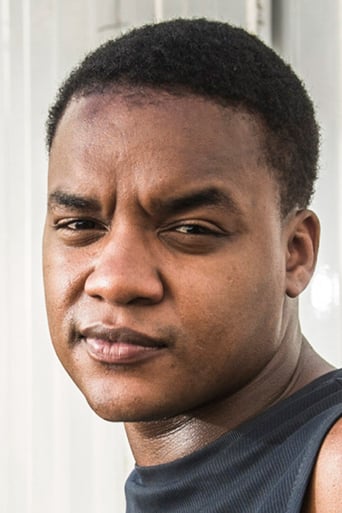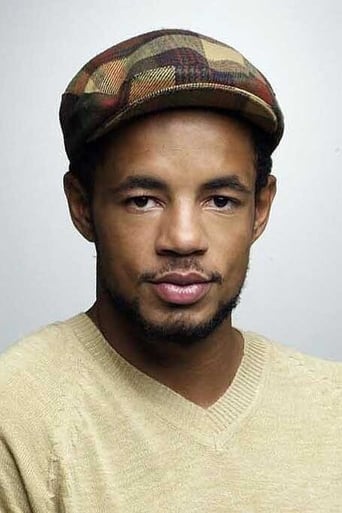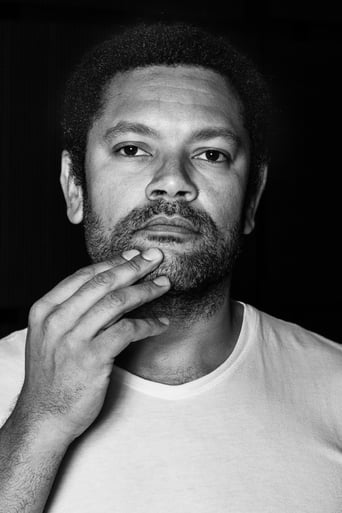Actuakers
One of my all time favorites.
Intcatinfo
A Masterpiece!
Haven Kaycee
It is encouraging that the film ends so strongly.Otherwise, it wouldn't have been a particularly memorable film
Fleur
Actress is magnificent and exudes a hypnotic screen presence in this affecting drama.
Roland E. Zwick
"City of Men" is a feature film version of a blockbuster series that ran on Brazilian TV from 2002 to 2005. It is also a sequel of sorts to the earlier "City of God," an award-winning movie directed by Fernando Meirelles.Paul Morelli's "City of Men" focuses on Laranjinha (Darlan Cunha) and Acerola (Douglas Silva), two honorable teens who are struggling to make a decent life for themselves in the slums of Rio de Janeiro. The former is searching for the father he's never known, while the latter is only beginning to learn what it means to be a father to his own son. Their personal story is set against the backdrop of a violent turf-war between two rival gangs that are battling it out for preeminence in the city."City of Men" reveals its origins as a TV series in the novelistic approach it takes to storytelling and character development. From the beginning, we feel as if we have been thrust into the midst of a story "already in progress." With little explanatory background, the screenplay (by Elena Soarez) introduces us all at once to a multiplicity of characters, whose relationships with one another we are forced to pick up almost on the fly as it were. This allows us to become both an observer of and an active participant in the drama that unfolds.Certainly, one of the most important characters in the movie is the city itself, since it is this very environment of poverty, hopelessness and violence that, in large measure, determines the kinds of lives these people will lead and the types of futures they will have.Morelli's directorial style is up-close-and-personal in the more intimate moments, and vivid and exciting in the pulse-pounding "action" sequences. The sense of immediacy that he and cinematographer Adriano Goldman bring to the work acts as an effective counterweight to some of the more melodramatic elements that creep into the screenplay towards the end.With excellent performances and a surprising amount of optimism given its generally depressing milieu and setting, "City of Men" is a tale of friendship and adult responsibility that will move the spirit and touch the heart.
evanston_dad
"City of Men" is a companion piece to Fernando Meirelles' 2002 film "City of God," but it's a much different animal from the earlier film. Both are set in the slums of Rio de Janeiro, and both are about young men fashioning lives for themselves out of the only resources available to them. But whereas "City of God" was kinetic, angry and immediate, "City of Men" is more reflective and conventional, and it comes to a much more hopeful conclusion than the earlier film."City of Men" is by far the weaker of the two. The carefully crafted screenplay was full of the heavy themes and plot twists of a Shakesperean tragedy, but I found myself missing the unscripted, documentary-like feel of Meirelles' film. "City of Men" is about the absence of fathers, and about two friends who find themselves fighting on opposite sides because of deeds committed by their own dads -- sons literally inheriting the sins of their fathers. But the script is too often heavy handed, and the director, Paulo Morelli, chooses to communicate too much about the lives of these people through blunt exposition. We don't learn about them from what the actors playing them do or how they act, but rather through the lines they read, and we're almost always aware that they're reading lines.Nevertheless, the acting is strong enough that I found myself caring for the two leads and fairly engrossed in how their stories turned out. Morelli isn't as accomplished a director as Meirelles, but the film is still well directed on its own more modest terms. If I didn't already have "City of God" to compare it to, I might have liked it even more.Grade: B+
johnsmith2022
I had seen the 19-episode TV series on DVD, and I had been awaiting the movie since it was filmed in 2006.I received the movie on DVD on July 1. I really liked the movie because it stayed true to the TV show ( mostly ) and also because it finally touched on a subject that many whom are familiar with the TV series had been wondering about: the estranged fathers of the boys. In fact, much of the movie is centered specifically around this topic.There's not much I can say here without spoiling it. But rest assured that this movie ( preceded by watching the TV series ) is something that you will want to see.
Chris Knipp
This sepia-sunbleached feature derives from, and features the same main characters as, the eponymous 2002-2005 Brazilian TV series about (mostly) boys in the "favela" hill ghettos above Rio for which Morelli did some of the writing and directing. The series, starring Darlan Cunha as Laranjinha (Wallace) and Douglas Silva as Acerola (Ace) --growing up from year to year and episode to episode--sort of grew out of the Fernando Meirelles/Kátia Lund film, 'City of God,' which in turn was based on Paulo Lins' tumultuous and partly autobiographical novel about three decades in the slums and the involvement of youth as dealers, assassins, and victims. Actually the Ace/Wallace characters as young teenagers, always played by Silva and Cunha, predate 'City of God' by two years; they appeared in a short film called 'Palace II' in 2000. The history of these films and stories is as intricate as the world they depict. Douglas Silva was the prepubescent tough in 'City of God' known by he moniker Dadinho--Lil' Dice.'City of Men' is warmer and more intimate than the original film. 'City of God' has been both admired for its virtuosity--it's full of tours de force of visual violence and equally brilliant feats of rapid storytelling--and condemned as reveling too much in blood and gore, making teenage killers who terrorize neighborhoods into little glamor boys. That's quite true. It's unfortunately also true that in the ghettos of Rio as of other places such as the USA, young gun-toting drug dealers are the sexy local pop stars. Maybe the earlier film fails to take a sufficiently clear moral stand, or too much reflects the viewpoints of the young favela males it depicts. Nonetheless it's exhilarating film-making. Paradoxically, it also has a more positive arc than 'City of Men,' because its hero works his way out of the slums and into mainstream Rio de Janeiro to become a photojournalist. In 'City of Men,' nothing like that happens. Instead, there is a difficult reconciliation between the two boys, on the brink of eighteen, despite a stunning revelation about their lost fathers, and one of the fathers comes back into the picture and, reluctantly at first, chooses to be a warm presence in the life of his son. Both of the boys endure moments of terrible loneliness and isolation, which reveal how isolating the world of shifting and dangerous loyalties and hills fought for and lost is for a boy who in the first place lacks parents. But the focus is on the reconciliations.In the TV series, the boys are in school. They face difficulties even showing up, and only one of them, Ace (Silva) really hits the books (he's also fascinated by guns of all kinds). Laranjinha is closer to turning into a young hood.Thugh the new movie 'City of Men' is less specific than the TV series (judging by the DVD collections of episodes that I've seen) and suffers a bit by comparison with either it or 'City of God,' the vibrancy of the life on offer in all these films is still unmistakable, as well as the attractiveness of the young actors, the warmth of the world evoked--and vernacular swiftness that of the filming and editing, which somehow is both relaxing and unnerving.Wallace/Laranjinha is trying to find out who his real father is; he doesn't want "unknown" to be on the place for "father" on his papers. Acerola knows his father is dead, and he wants to know what happened. He's faced with the local problem from the other side. His wife Cris (Camila Monteiro) keeps leaving their toddler son Clayton (Vinicius Oliveira) with him to take care of. He doesn't want to accept the responsibility. But if he reneges on it, he'll leave Clayton in the same place he and Wallace are in. Ace abandons Clayton on the beach early on when Madrugadão (Midnight, Jonathan Haagensen), the gang leader of the hill where they live, risks assassination to descend on a super-hot day for a swim in the ocean. He also turns some flashy cartwheels and shows off his spectacular pecs. Madrugadão, like Wallace (i.e. Darlan Cunha), is handsome and charismatic. Ace is so childish he forgets his own son; but he rushes back and finds him. And when Cris gets a job in the wealthier city of São Paulo, Ace, with great difficulty, forces himself to take on the responsibility of raising Clayton.Wallace (perhaps a bit too easily) finds his father, a bearded man named Heraldo (Rodrigo dos Santos), who has just gotten out of prison after serving fifteen years of a twenty-year sentence--for murder. Heraldo's beard cannot conceal the fact that he is not very mature. He hasn't shouldered the responsibilities of being a man. But he also carries the weight of suffering and gratitude.When rival gang leader Fasto (Eduardo "BR" Piranha) takes over Midnight's territory on Dead End Hill, a new gang war breaks out right in the middle of Ace and Wallace's journey of self-discovery.'City of Men' is a more tender, individual and grownup story than 'City of God'; from what I've seen of the TV series it grows out of, it's less specific and less witty. It works as a kind of antidote to the amorality one feels in 'City of God,' and its warmth is touching. Nor is it visually ineffective, or its sense of the milieu less rich--except. Except that it quite lacks the momentum and adrenaline-rush brilliance of 'City of God's' virtuoso film-making and editing, or the rich range of minor characters the latter has. It is a little bit meandering, and its fast jump-cut slides from scene to scene sometimes seem out of place. As the AV Club reviewer says, much has been gained in this new film, but much has been lost as well. Still 'City of Men' is well worth watching.





